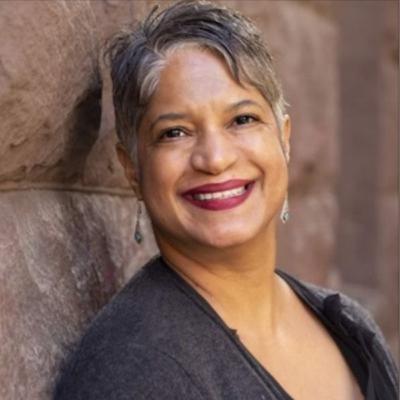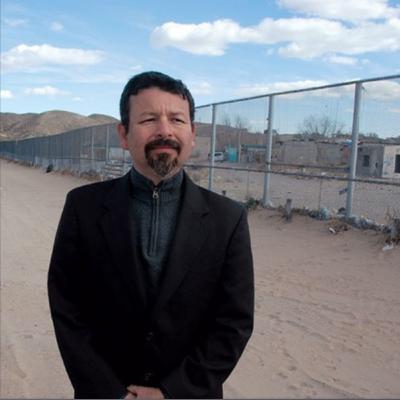Discover TrumpWatch with Jesse Lent
TrumpWatch with Jesse Lent

TrumpWatch with Jesse Lent
Author: WBAI 99.5fm, New York City's Pacifica radio station
Subscribed: 12Played: 58Subscribe
Share
© WBAI 99.5fm, New York City's Pacifica radio station
Description
TrumpWatch with Jesse Lent is produced by WBAI 99.5FM Pacifica Radio New York. Join us as we take a deep dive on a different aspect of the Donald Trump administration in each episode.
128 Episodes
Reverse
On December 7, 2016, “TrumpWatch with Jesse Lent” debuted on WBAI 99.5fm, New York City's Pacifica station. Through 127 episodes, we did our best to cut through the bluster coming from the White House to help you figure out the concrete ways that our country has been changed by Donald Trump and his administration. For our final show, we take your calls on how the resistance to this president has changed protest movements in the US.
Of all the consequences of climate change that we know about, one that rarely gets discussed is its affect on the affordable housing crisis. Back in June, President Trump (who has denied the existence of global warming throughout his presidency) signed an executive order aimed at “tearing down red tape in order to build more affordable housing.” But as reported in Teresa Wiltz’s article for The Pew Charitable Trusts Statewide blog, “Climate Change Is Making the Affordable Housing Crunch Worse,” the administration’s refusal to engage in efforts to reduce carbon emissions is creating larger issues than red tape to contend with. On this week’s TrumpWatch, Teresa Wiltz explains why climate change is making the housing crunch even worse.
On Monday, attorneys general for 19 states and the District of Columbia announced a lawsuit against the Trump administration in the hopes of blocking a sweeping new rule which would allow Immigration and Customs Enforcement to indefinitely hold migrant families in detention. But will it work? On this week’s TrumpWatch, immigration reporter for Reuters Mica Rosenberg unpacks this blue state attempt to block President Trump’s border policy in the courts.
Veterans of the US Armed Forces will have a harder time receiving green cards than currently active service members, according to a new report from Yeganeh Torbati, Isaac Arnsdorf and Dara Lind of ProPublica. Since Veterans Affairs officials declined to step in to exempt their members from a Trump administration policy restricting green cards for low-income immigrants, vets will not be entitled to any of the exemptions open to currently enlisted military personnel. On this week’s TrumpWatch, Yeganeh considers what the reporting of her and her ProPublica colleagues tells us about the way this federal agency is being run in the Trump era.
On Aug. 12, the Trump administration announced plans to change how it how it enforces the Endangered Species Act, the landmark 1974 law believed to have rescued the bald eagle, the grizzly bear and the American alligator from going extinct. On this week’s TrumpWatch, Ben Lefebvre, author of the POLITICO article “Trump administration eases endangered species rules,” helps break down what this new interpretation will mean for the effort to save threatened animals.
With all eyes trained on former special counsel Robert Mueller’s testimony before Congress, we take a look at the issue that got us here—Russian interference in the 2016 election. According to Adam Piore, author of the July 23 Newsweek article “Russia Is Using Cold War Strategy to Undermine the Faith of Americans in the 2020 Election—Will It Work?” the strategy being deployed ahead of the 2020 presidential election has disturbing echoes of 2016. While a July 18 Brennan Center for Justice report entitled “Federal Funding Needs for State Election Security” highlights dangerous vulnerabilities in the voting systems of six states. Join us for a conversation on the state of US elections today with Adam Piore of Newsweek and Christopher R. Deluzio, a co-author of the Brennan Center study, on this week's TrumpWatch.
Acting White House chief of staff Mick Mulvaney reportedly told attendees at a recent fundraising retreat in Chicago that he doesn't attempt to control the President’s tweeting, time or family. Instead, according to the July 15 Washington Post article “‘His own fiefdom," he is building his own power base in Washington through a formerly inactive White House office called the Domestic Policy Council. On this week’s TrumpWatch, Lisa Rein, a reporter covering federal agencies and the management of government in the Trump administration for the Washington Post, helps break down her reporting on Mulvaney’s efforts and considers their ramifications for American politics.
On July 1, when ProPublica reporter A.C. Thompson revealed the existence of a secret Facebook group of 9,500 Border Patrol agents with posts joking about migrant deaths and illustrations of the President sexually assaulting a Congresswoman, the public backlash was swift and severe. Acting secretary of Homeland Security Kevin McAleenan promised to hold accountable “any employee found to have compromised the public’s trust.” But according to reporting by Ted Hesson and Cristiano Lima of POLITICO, the existence of the group had been an open secret among Customs and Border Protection officials for years. This week on TrumpWatch, Ted discusses what we know about the now-defunct group, who knew about it and what it tells us about the prevailing culture among Border Patrol agents.
With the third acting defense secretary President Trump has placed in the position within the past month looking like he will be forced to temporarily resign and Secretary of State Mike Pompeo playing an increasingly active role in interactions with longtime US adversaries like Iran and North Korea, it is currently difficult to determine exactly where our foreign policy ends and military policy begins. On this week’s TrumpWatch, Adam Weinstein, national security editor for The New Republic, helps untangle who has the President’s ear when it comes to international relations.
With major news developments arriving fast and furiously theses days, it’s easy to forget that the US is actively engaged in a trade war with China. President Trump will head to Osaka, Japan for the G-20 summit this week and he has threatened additional tariffs if Chinese President Xi Jinping won't meet with him there. On this week's TrumpWatch, Soumaya Keynes, US economics editor for The Economist and co-host of the Trade Talks podcast, examines what effect President Trump’s tariffs on China are having on their economy and ours.
On June 13, two oil tankers that had just passed through the Strait of Hormuz were damaged after an explosion struck both ships. The US government was quick to blame Iran for the attack on The Kokuka Courageous, a tanker owned by Japan and en route to Singapore and The Front Altair, a Norwegian-owned tanker on its way to Taiwan. And while both President Trump and Iranian president Hassan Rouhani say they do not want war, the inflammatory statements coming from their respective administrations appear to be at odds with that goal. In this episode of TrumpWatch, Julian Borger, world affairs editor for the Guardian, breaks down what is happening to diplomatic relations between the two countries and explains how the President’s decision to pull out of the Iran nuclear deal could affect what happens next.
As congressional Democrats clash over whether or not to impeach the President following the controversial release of the Mueller report, there appears to be one politician surprisingly supportive of the idea—the President himself. In his June 11 article “Trash-talking Trump aims to weaponize impeachment,” senior White House reporter for POLITICO Darren Samuelsohn spoke to a dozen people in President Trump's inner circle in an attempt find out why he appears to be so supportive of the idea. On this week’s TrumpWatch, Darren explains why the President could be genuinely pleased if and when impeachment proceedings start up in the House.
Last week, President Trump announced plans to roll out a 5 percent tariff on “all goods coming into our country from Mexico” in retribution for what he described in a Twitter post as that nation’s role in the “illegal immigration problem.” When the President threatened to tack on an additional 5 percent for every month Mexico refuses to engage in border enforcement up to his administration's standards, many Republican lawmakers, long seen as being from the party of free trade, clearly were not happy. Senator James Lankford of Oklahoma told POLITICO that the Trump administration is “trying to use tariffs to solve every problem but HIV and climate change.” But will their displeasure translate into action in Congress? In this episode of TrumpWatch, Amber Phillips, a reporter for the Washington Post political blog The Fix discusses the storm brewing on the hill over tariffs and considers whether it could affect the nearly unanimous support the President has enjoyed from his party throughout his time in office.
On Tuesday, the Supreme Court agreed to what the Washington Post described as a “compromise on a restrictive Indiana abortion law,” allowing the state to regulate disposal of the “remains” of an abortion. Nine other states have passed similar laws restricting women's reproductive rights. Will the Supreme Court, presumably a more conservative body now that President Trump’s two appointments (Brett Kavanaugh and Neil Gorsuch) have been sworn in, overturn or undermine Roe v. Wade, the landmark 1973 decision protecting access to a safe and legal abortion? In this installment of TrumpWatch, Staci Fox, president and CEO of Planned Parenthood Southeast talks about where this fight is headed.
Last month, the Supreme Court heard arguments over whether to allow a question on the 2020 census that asks whether the person filling out the form is a US citizen. In this installment of TrumpWatch, Wennie Chin and Paul Westrick of the New York Immigration Coalition, one of the original plaintiffs in that case, discuss what the consequences of a citizenship question would look like.
When 2020 presidential hopeful Senator Bernie Sanders appeared in a Fox News town hall on April 15, many of his supporters saw it as an inspired attempt to reach across the political divide. Yet, for one regular viewer of the cable news channel, long decried by media critics as being a mouthpiece of the Republican agenda, Sen. Sanders was not welcome. “So weird to watch Crazy Bernie on Fox News,” President Trump tweeted the following morning. “Not surprisingly, Bret Baier and the ‘audience’ was so smiley and nice. Very strange.” Trump even added, “what’s with Fox News?” in a subsequent tweet later that day. As anyone who even remotely follows cable news knows, Fox News has given the President nearly blanket support for even his most controversial policies and was an enthusiastic booster throughout his campaign. Is a change brewing at the President’s favorite network? On this week’s TrumpWatch, Daniel Lippman discusses his recent POLITICO article co-written with Eliana Johnson “Trump's Fox News love fest hits a rough patch.”
On April 10, President Trump signed two executive orders meant to speed up the construction of pipelines like the Keystone XL (KXL) and other methods of transporting oil and natural gas across borders. For residents of the Pine Ridge Reservation in South Dakota, thousands of whom remain trapped after weeks of flooding caused by rising waters, the announcement was a slap in the face. Oglala Sioux Tribe Tribal Chair Julian Bear Runner told reporter Alleen Brown of The Intercept that Trump's latest executive orders felt "like being kicked while we’re down.” In this episode of TrumpWatch, Cheyenne River tribal chairman Harold Frazier joins Alleen and Jesse for a discussion of how the President's actions will affect indigenous people throughout the region .
On Monday, White House officials reclassified the elite military force the Islamic Revolutionary Guard Corps (IRGC) as a terrorist group. It is the first time in US history that a sitting president has accused a foreign government of terrorism. But is this move, which raised eyebrows coming on the eve of Israeli elections, just another presidential norm left shredded on the floor of the Oval Office or something more significant? On this week’s TrumpWatch, the diplomatic correspondent for the Washington Post Carol Morello examines what the reclassification of the IRGC will mean for relations between the US and Iran.
On Friday, President Trump stated in a series of tweets, “I will be closing the border, or large sections of the border, next week,” adding “we lose so much money with them, especially when you add in drug trafficking etc., that the border closing would be a good thing!” On this week’s TrumpWatch, Fernando Garcia, founder and executive director of the Border Network for Human Rights (BNHR) an immigration reform and human rights advocacy organization based out of El Paso, Texas, talks about the way the proposed border closure would affect the work he and the BNHR are doing.
Last Friday, President Trump announced on Twitter that he was ordering the Treasury Department to withdraw new sanctions on North Korea. But as there were no “additional large-scale sanctions” on North Korea like the ones the President claimed were currently in the works, the tweet sent his staff into a state of confusion according to a report from Bloomberg News. On this week’s TrumpWatch, Jenny Town, a research analyst at the Stimson Center and managing editor of 38 North, helps clarify what is happening in the murky waters of US-North Korea relations.
























